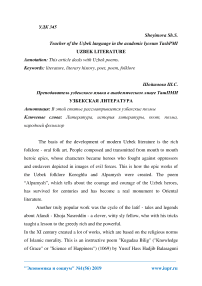Uzbek literature
Автор: Shoyimova Sh.S.
Журнал: Экономика и социум @ekonomika-socium
Статья в выпуске: 1-1 (56), 2019 года.
Бесплатный доступ
This article deals with Uzbek poems.
Literature, literary history, poet, poem, folklore
Короткий адрес: https://sciup.org/140241260
IDR: 140241260
Текст научной статьи Uzbek literature
Another truly popular work was the cycle of the latif - tales and legends about Afandi - Khoja Nasreddin - a clever, witty sly fellow, who with his tricks taught a lesson to the greedy rich and the powerful.
In the XI century created a lot of works, which are based on the religious norms of Islamic morality. This is an instructive poem "Kugadau Bilig" ("Knowledge of Grace" or "Science of Happiness") (1069) by Yusuf Hass Hadjib Balasaguni
(Yusuf Balasagunsky), poem "Hibat al-Hakayik" ("Gift of Truths") by Ahmad Yunaki and especially the Dictionary of Turkic Adverbs (1072-74), compiled by Mahmud Kashgari.
Fiction flourished in the historical era of Amir Temur and the Temurids. Its popularity is based on the fact that the works acquire a more secular character, freeing themselves from excessive religiosity. During this period, the great Eastern poet, thinker and politician Alisher Navoi, who is considered a classic of Uzbek literature and the founder of the Uzbek language, creates. His imperishable works, Chordevon and Khamsa, are included in the treasury of world literature and translated into hundreds of world languages.
The last of the Timurid dynasty, the founder of the Great Mogul power in India, which existed for two centuries, Zahiriddin Muhammad Babur, was not only a talented ruler and commander, but also became famous as a bright poet of his time. His epic poem “Baburname”, in which, describing his biography, he describes the history of the peoples of Central Asia, Afghanistan and India, is a masterpiece of Uzbek literature, a valuable historical and literary monument of that time.
Uzbek literature of the 18th and 19th centuries is mainly lyrical, and is dedicated to the love theme. Nadir, Uvaysi, Mashrab, Khorezmi and many others do this period.
At the end of the 19th and the beginning of the 20th centuries, after the annexation of Turkestan to the Russian Empire, a new modern stage of Uzbek literature began, the most prominent representatives of which were the poet Mukimi and the writer, the poet and satirist Furkat. At the beginning of the 20th century, such talents as the poet and playwright Hamza Hakimzade Niyazi, the poet and writer Sadriddin Aini, flourished under Stalin, the first Uzbek novelist Abdullah Kadiri and the writer and philosopher Fitrat, whose literary traditions were continued by Oybek, Gaum Gomom, flourished in the Soviet era. Abdullah Kahhar, Hamid Alimjan, Uygun and others.
"Экономика и социум" №1(56) 2019


